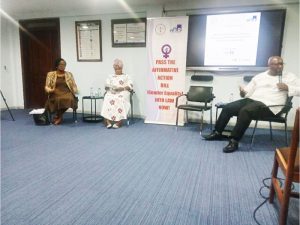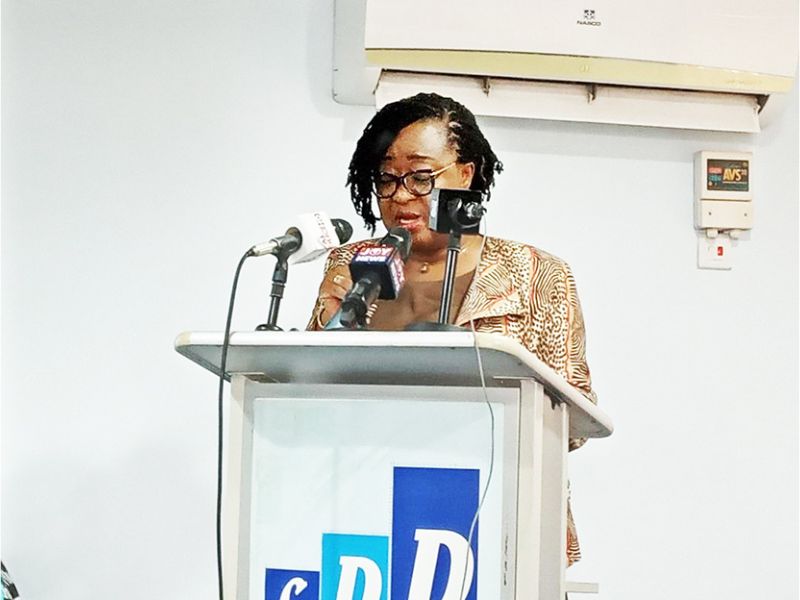
President Nana Addo Dankwa Akufo-Addo has been called upon to appoint a substantive minister for the Ministry of Gender, Children and Social Protection (MGCSP).
The call was made during a round table discussion held by the Ghana Centre for Democratic Development (CDD-Ghana) on the theme: “Averting the excessive delay in passing the Affirmative Action Bill – The Role of Stakeholders,” in Accra yesterday.
According to the Stakeholders, which include Civil Society Organisations (CSOs) and media, there is a need for government to appoint a substantive minister to the MGCSP to push the agenda for the passage of the Affirmative Action Bill.
Currently, the minister for Gender, Sarah Adwoa Safo, is in the United States.
Although the minister has been seen on social media and also granting interview to local media from her base in the United States, saying that she was taking care of her sick child.
The group holds the view that someone responsible, committed and dedicated to the job must be appointed to take over from the Dome-Kwabeya Member of Parliament (MP).
Sheila Y.N. Minkah-Premo, Convenor of Affirmative Action Bill, made the call while taking her turn to address the audience in the hall of CDD-GHANA on the status of the bill.
The Convenor was of the view that the passage of the bill needs a firm political will from a sector minister, who will supervise the process till it becomes law.
She said the journey of affirmative action dates back to independence, but the bill had been in the pipeline since 2011.
Madam Sheila added that the closer the bill has ever come for passage was in 2016, but has since been reversed back to cabinet for reconsideration.
With several failed attempts to see the passage of the bill, Madam Sheila suggested that government should be pressurised to accelerate the process of passing the bill into law, particularly when there has been significant drop in women representation in Parliament.
She argues that the passage of the bill would put Ghana in the spotlight at the international arena, as it will be joining the league of African countries which have achieved same feat.
Madam Sheila added that challenges that have hampered women from active politics have been religious barriers, financial resources, the nature of Ghanaian politics and lack of education among others.
Emefa Apaw, a media practitioner, on her part stated that stakeholders must not exempt the usage of social media in creating awareness, as well as decentralisation of advocacy to promote the passage of the bill.
According to her, the media must not be left out in the fight due to its role in educating, informing, creating awareness and persuading the public.
Per her estimation, the media has the power to avert the excessive delays in the passage of the bill but “that power can be fully utilised or unleashed if the media is first and foremost fully equipped and with the proper training to ask relevant questions, fully armed with information…”
She urged media practitioners to take up role as ambassadors to champion the course of the bill.
Shamima Muslim, Founder and Convener of the Alliance for Women in Media Africa (AWMA), added that critical concerns about the bill, leading to public understanding and acceptance should be employed.
Director of Advocacy and Policy Engagement at CDD-GHANA, Dr Kojo Asante Pumpuni, said the bill is about people and nothing else, as “we are all citizens and must be treated the same.”
He urged that there must be strong advocacy and establishment of a secretariat with people who have the technical knowledge to explain issues to the decimal point.
AABC Secretariat Executive Director at CDD-GHANA, Regina Amanfo Tetteh, said the Centre is very much committed to the advocacy to get the AAB passed into law, as it supports gender equality.
She adds “CDD-Ghana aims through this coalition to push for the introduction and passage of the Affirmative Action Bill because it aligns with the mission and vision of the CDD-Ghana.
“We aim to promote democracy, good governance and inclusive development, this mission cannot be achieved without the majority of the population (being women) participating effectively in governance, policy processes, and economic and social life.”









